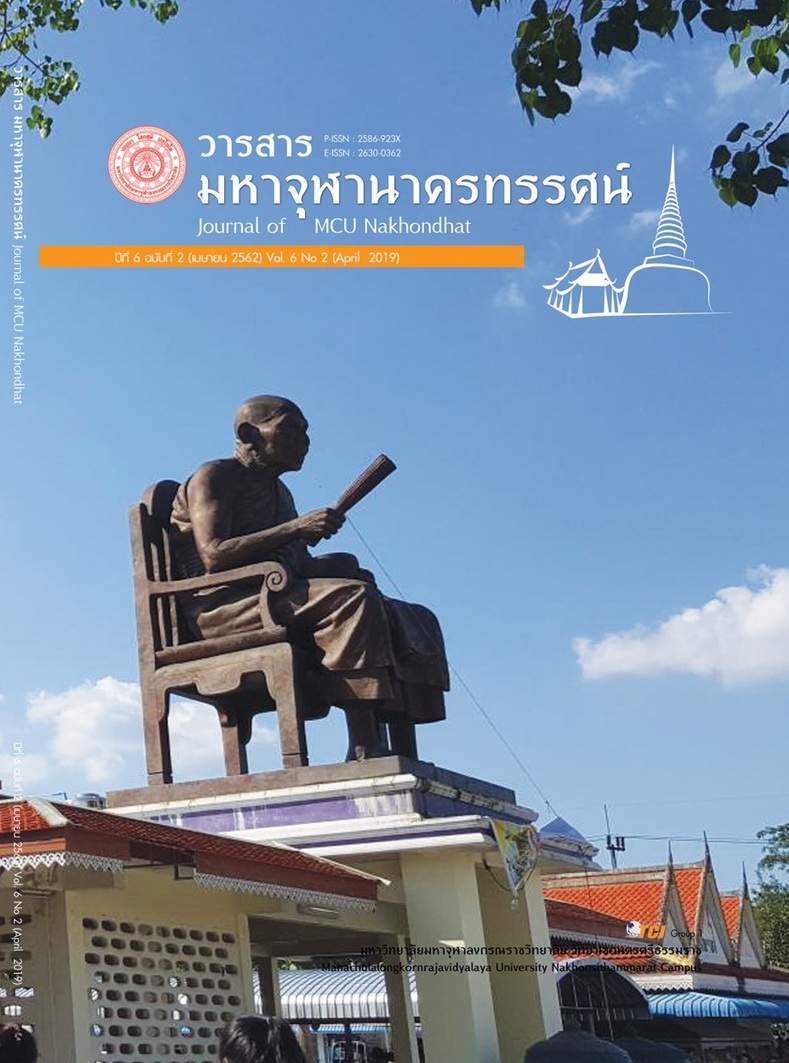THE SELF IN MICHEL FOUCAULT’S POSTMODERN PHILOSOPHY THROUGH THERAVADA BUDDHIST PHILOSOPHY
Main Article Content
Abstract
The objectives of this article are as follows: 1) to study the concept of self in Theravada Buddhist philosophy. 2) To study the concept of self in postmodern philosophy based on the concept of Michel Foucault. 3) To analyze the self of Michel Foucault through the Theravada Buddhist philosophy. 4) To create a new body of knowledge of the self to improve the quality of human life. This research is a qualitative research by studying the analytical description through the analytic, appreciative and regulatory approach so as to lead to the creativity of new knowledge in philosophy.
The results of study were found as follows:
- Theravada Buddhist philosophy explains that self is caused by ignorance and the combination of the Five Aggregates or Khantha, which is governed by the Three Characteristics of Existence or Trilaksana and the Dependent Origination or Paticcasamuppada. Knowing yourself as Soullessness or Anatta and to achieve Nirvana in the end is the way to be free from suffering.
2. The self or the subject in Michel Foucault’s postmodern philosophy is derived from human sciences. Foucault recommends that what should we do within this context is resistance, self-regulation, technology of self, practice of freedom and caring self.
- Foucault explains the human self as the conventional truth through the discourses, the power and the regime of truth in each era, which is a relative, dynamic and constantly changing, while Theravada Buddhist philosophy focuses on the metaphysical self and presents it as an absolute truth and it must be developed to the transcendental level which is the liberation from the self completely called Nirvana.
- The new body of knowledge from this study is Michel Foucault’s postmodern philosophy and Theravada Buddhist philosophy which focus on different levels of self, that is to say Foucault focused and explained human’s self on worldly level whilst Theravada Buddhist philosophy focused on transcendental level or metaphysics. Both philosophical concept has no conflict but significantly complementing each other and can be integrated into a new body of knowledge for human self-development.
Article Details
References
Foucault, Michel. (1982). "Sex, Power, and the Politics of Identity", in Michel Foucault. Ethics, Subjectivity and Truth. Essential Works of Foucault 1954-1984, ed. Paul Rabinow. New York: The New Press.
Foucault, Michel. (1988). Technologies of the Self: A Seminar with Michel Foucault. (L. H. Martin, H. Gutman, P. H. Hutton, Eds.). Amherst: Mass: University of Massachusetts Press.
Foucault, Michel. (1994). “Technologies of the Self” Ethics: Subjectivity and Truth. New York: The New Press.
Foucault, Michel. (1997). “The Ethics of the Concern of the Self as a Practice of Freedom” Ethics: Subjectivity and Truth. New York: The New Press.
ธเนศ วงศ์ยานนาวา. (2548). การสร้าง “ซับเจค” บทวิพากษ์ Foucault และการวิเคราะห์ “ซับเจค” จากภาพ Las Meninas. กรุงเทพมหานคร: คณะรัฐศาสตร์ มหาวิทยาลัยธรรมศาสตร์.
พระมหาสมศักดิ์ ธมฺมวฑฺฒโน. (2548). การศึกษาเชิงวิเคราะห์เรื่องทฤษฎีขณิกวาทในพุทธปรัชญาเถรวาท. วิทยานิพนธ์ศาสนศาสตรมหาบัณฑิต บัณฑิตวิทยาลัย: มหามกุฏราชวิทยาลัย.
พุทธทาสภิกขุ. (2560). ตัวกู ของกู. กรุงเทพมหานคร: อมรินทร์ธรรมะ.
มหาจุฬาลงกรณราชวิทยาลัย. (2539). พระไตรปิฎกภาษาไทย ฉบับมหาจุฬาลงกรณราชวิทยาลัย. กรุงเทพมหานคร: โรงพิมพ์มหาจุฬาลงกรณราชวิทยาลัย.
ศิริวรรณ โอสถานนท์. (2539). ตัวตนในทัศนะของพุทธปรัชญาและปรัชญาของเดวิด ฮูม : การศึกษาวิเคราะห์เชิงเปรียบเทียบ. พุทธศาสน์ศึกษา, 3 (2), 53-57.
อภิภา ปรัชญพฤทธิ์. (2554). หลังสมัยใหม่นิยมและการอุดมศึกษา. กรุงเทพมหานคร: พิมพลักษณ์.
อานันท์ กาญจนพันธ์. (2555). คิดอย่างมิเชล ฟูโกต์ คิดอย่างวิพากษ์. เชียงใหม่: มหาวิทยาลัยเชียงใหม่.


